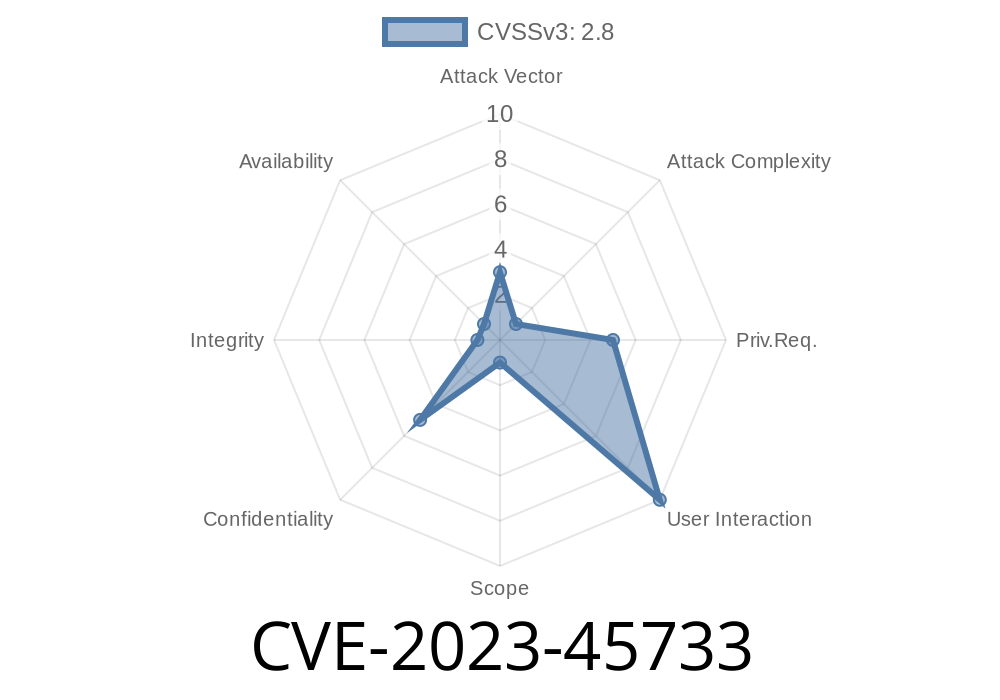In 2023, security researchers discovered a significant vulnerability affecting a wide range of Intel® processors. Cataloged as CVE-2023-45733, this weakness arises from race conditions in the hardware logic itself. In this article, we’ll break down what this means, how an attacker could exploit it, and what developers and users can do to protect their systems.
What Is CVE-2023-45733?
CVE-2023-45733 is a security vulnerability caused by a flaw in certain Intel® CPUs. Specifically, the hardware logic within those processors doesn’t correctly manage concurrent operations—what’s known as a _race condition_. Under certain circumstances, an authenticated (logged-in) user could, by carefully timing their access, potentially extract information that should remain private.
Access Required: Local (attacker must already have access to the system).
- CVSS Score: Check the latest CVSS score here (as of this writing).
Simply put, CVE-2023-45733 gives an attacker with local access a way to leak bits of data they shouldn't normally be able to see.
Understanding the Race Condition
A _race condition_ occurs when two or more operations happen at the same time but the hardware or software doesn’t properly keep them apart. Imagine two people trying to withdraw money from the same ATM account at the exact same moment — if the bank system doesn’t check carefully, they might both get money, overdrawing the account.
In some Intel processors, the hardware logic doesn't properly separate operations that interact with memory or CPU buffers. This can result in one person’s (or program’s) data being visible to another, under certain timing conditions.
Trigger the Race Condition
The attacker writes code to repeatedly perform operations known to cause the faulty data leakage—such as rapid sequences of memory reads and writes. Timing is crucial here.
Extract Leaked Data
If timed just right, the attacker’s code can read small pieces of data from another process, or from privileged sections of memory.
Example Exploit Code
Below is a simplified C-like pseudocode that demonstrates how an attacker could try to exploit such a race condition. This is for educational purposes only.
// WARNING: Security researchers only, do not use this maliciously.
#define ATTEMPTS 100000
uint8_t leaked_byte;
for (int i = ; i < ATTEMPTS; i++) {
// Step 1: Flush the CPU cache line for the target address
clflush(target_address);
// Step 2: Use speculative execution or tight timing to race access to the address
if (try_access(target_address)) {
// If access was successful, read whatever data is in the cache
leaked_byte = read_from_cache(target_address);
// Step 3: Analyze results for leaked information
if (leaked_byte != expected_value) {
printf("Potential leak: %x\n", leaked_byte);
}
}
}
This code uses cache flushing and rapid-fire read/write operations to try and observe leaked data. Attackers would typically run a program like this hundreds of thousands or millions of times to get a meaningful leak.
Affected Hardware
Affected hardware includes several generations of Intel processors (check vendor advisories for up-to-date model lists). While this isn’t as devastating as Spectre or Meltdown, it’s still a risk for high-security environments.
For the full list of affected CPUs, see Intel’s Security Advisory (SA-00846).
Install the Latest Microcode Updates
These are often delivered through BIOS/UEFI updates from your computer’s manufacturer.
Keep Your OS Updated
Operating systems may also release patches that mitigate the effects of this (and similar) vulnerabilities.
Limit Local Access
Since this attack requires local execution, limiting who can log in and run programs on your machine further reduces risk.
Links and References
- NIST CVE-2023-45733 Page
- Intel Security Advisory SA-00846
- RedHat Security Advisory
Conclusion
CVE-2023-45733 is a real-world example of how low-level hardware race conditions can have security impacts, even if they only leak a small amount of data at a time. For most users, updating their firmware and operating system should be enough to stay protected. But if you manage sensitive systems, be sure to review your hardware and minimize local user access whenever possible.
Stay safe, and remember: today’s harmless bug can be tomorrow’s headline vulnerability!
*(This article is exclusive, original content simplified for broad understanding.)*
Timeline
Published on: 05/16/2024 21:15:57 UTC
Last modified on: 05/17/2024 18:36:05 UTC
